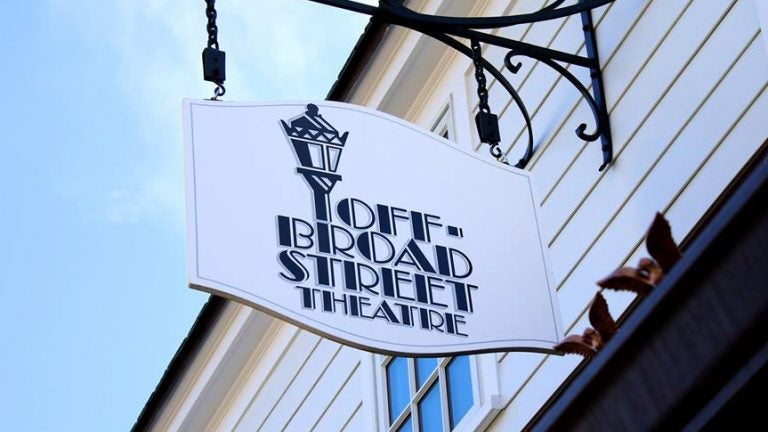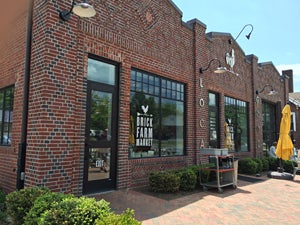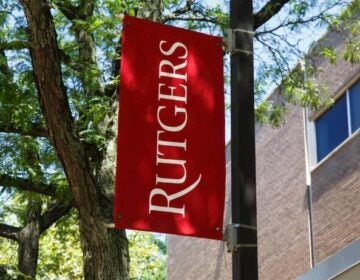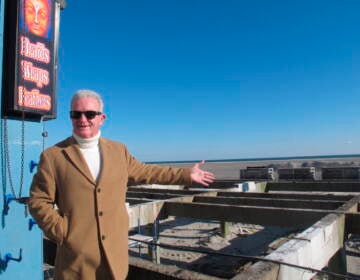Movies, lectures and concerts coming to Hopewell, NJ’s playhouse

The Off Broadstreet Theater building has new owners with plans to expand its offerings. (Photo courtesy of Off-Broad Street Theatre)
In the past several years, Hopewell, New Jersey has gone from a quaint little town of Victorian houses and antiques shops nestled in the Sourland Mountains—what some have called “Vermont in New Jersey”—to one whose main street is bustling with the type of restaurants that attract diners from New York, Philadelphia and, well, Vermont. Among those who have played a large role in putting Hopewell on the map are Robin and Jon McConaughy.
The former executive recruiter (Robin) and hedge-fund manager (Jon) started by buying up land on which to graze their cattle. They wanted their children to know where their food was coming from—and soon they found themselves overseeing the birthing of lambs, pigs and calves. Double Brook Farm grew and grew until they opened Brick Farm Market on Hopewell’s Broad Street in 2013.

Brick Farm Market
Next came Brick Farm Tavern, a farm-to-table restaurant in a restored farmhouse that opened its doors in late 2015. Their latest venture is the Hopewell Playhouse.
In the same building as the Off-Broadstreet Theatre, operated for 30 years by Bob and Julie Thick and just a stone’s throw from Hopewell’s gazebo, post office and fire station, Hopewell Playhouse fits with the McConaughys’ other operations because the live performances will be accompanied by catered food.
The Thicks sold the building to McConaughy, along with partners Liza Morehouse and Mitchel Skolnick, and will continue, as tenants, to produce the musicals and farces that were its fare for three decades. The Thicks opened Off Broadstreet in 1984 as a dessert theater—with Julie fielding questions about how she had time to bake hundreds of desserts while producing plays (the desserts were always outsourced, but sweetened the theatrical experience for patrons).
“For our events we’ll offer saltier things like sandwiches and popcorn,” said Jon McConaughy. He plans to work with other Hopewell restaurants to cater food, such as Nomad Pizza and SweetGrass. McConaughy envisions live theater as part of the downtown Hopewell experience, along with dining at the many restaurants such as Blue Bottle, Brothers Moon, and of course his own Brick Farm Tavern.
The lobby has been remodeled with a new ticket booth, serving bar, catering kitchen and restrooms on the first floor (a major problem in the past was that the only restrooms were on the upper level, not always convenient for the theater-going set). Tiered theater-style seating replaces some of the former tables and chairs. Even these were upgraded to be more comfortable, and state-of-the-art sound and lighting systems have been installed. Concerts, live TED talks, film, staged readings, presentations on sustainable living and farming, and other productions are planned. An open house was held in March, along with cabarets, staged readings of A.R. Gurney’s “Love Letters” and jazz in April.
The 1940s-era building on South Greenwood Avenue once housed the Colonial Playhouse and the Gallup Organization, which screened commercials and gave viewers questionnaires to get feedback on their effectiveness.
The McConaughys originally envisioned the building as a creamery for their dairy—presently, in order to sell non-homogenized milk, they work with a dairy in Pennsylvania to bottle it—but talks about the creamery fizzled when they realized that the logistics were not right. Brick Farm is now working with a dairy partner in Ringoes, where they hope to expand into making ice cream and cheese. “Homogenization breaks down the fat so you don’t have to shake the milk, and makes its last longer—it’s all about convenience, but the flavor is sacrificed,” said McConaughy, whose mother raised him on non-homogenized milk until he was 15. “In the early ‘70s, New Jersey outlawed raw milk.”
The Off-Broadstreet Theatre was different from other theaters in that it was a for-profit venture, and the Hopewell Playhouse will continue to run as a for-profit center, collecting rent, for example. The three partners are still working on the details as to how to make a profit—selling food and beverages during performances will help—with the Thicks as models. “The Thicks have connections to performers who do this out of their love for performing,” said McConaughy. Perhaps touring artists will perform during the week, between New York and Philadelphia engagements, and local bands will perform on weekends, McConaughy speculated. And during-the-week performances will help bring diners to Brick Farm Tavern, especially for 5 or 6 o’clock seatings.
In line with McConaughy’s keep-it-local philosophy, local contractors were used for the remodeling. The bar was made from a local walnut tree and tables were made from locally milled wood. The original ceiling was removed to reveal the rafters, with tongue-and-groove pine that was cleaned and sealed, and new trusses were added for lighting and sound equipment. Think Form Architects designed the new space, with its porthole doors. “We preserved the charm but updated the comfort and equipment to be state-of-the-art,” said McConaughy.
His own performing days ended when he sang with a band for a dance at Princeton Day School while attending high school there, said McConaughy, but when pressed admitted that he trained for 12 weeks to dance at a fundraising event for Young Audiences, and for Robin’s 40th birthday party he learned to play guitar and sang for her. The McConaughys’ two sons, 13 and 16, play guitar and piano, but they’re not ready for the stage yet, he said.
Family is important to both Robin and Jon—Jon’s mother lives with them half of the year, Robin’s parents live in nearby Kingston, and her 94-year-old grandmother still lives in the farmhouse where she raised her children. Robin’s brother and his family live in another house on the farm. “What we do is about community and family—these things have been lost,” he said. “It’s rare that two or three generations get together.”
The Off Broadstreet Theater building will be renamed in April 2017. Skolnick said it’ll likely be called the Hopewell Theater Company. The new owners’ website is under construction, but any new events will be announced on their Facebook page.
The new Off Broadstreet season resumes May 13 with “The Dixie Swim Club” through June 11; “Sherlock’s Veiled Secret,” July 1-30; “Summer Stock Murder,” Aug. 19-Sept, 17; “Lombardi,” Oct. 7-Nov. 5; “Altar Boyz,” Nov. 25 through the year’s end, including a special New Year’s event. Performances Fridays and Saturdays, doors open 7 p.m. for dessert, performances begin 8 p.m. Sunday matinees feature dessert at 1:30 p.m., with the show beginning at 2:30 p.m. Admission $27-$31.50. http://off-broadstreet.com; 609-466-2766.
___________________________________________________
The Artful Blogger is written by Ilene Dube and offers a look inside the art world of the greater Princeton area. Ilene Dube is an award-winning arts writer and editor, as well as an artist, curator and activist for the arts.
WHYY is your source for fact-based, in-depth journalism and information. As a nonprofit organization, we rely on financial support from readers like you. Please give today.





